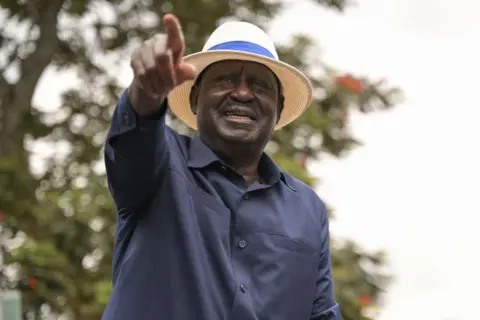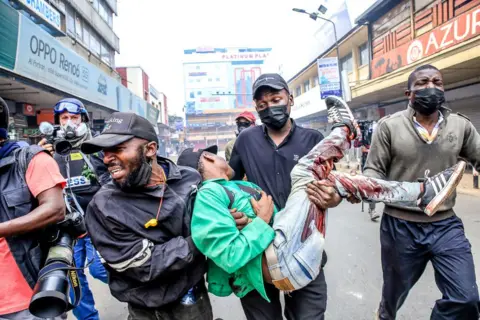How Kenya’s president has fallen out with his deputy
Kenya’s Deputy President Rigathi Gachagua has been threatened with impeachment proceedings by lawmakers amid intense speculation that he has had a major fallout with President William Ruto.
The president’s allies in parliament have accused Gachagua of undermining the government, promoting ethnically divisive politics, having a role in fuelling the deadly protests that rocked the country in June, and of being involved in corruption.
The power struggle has led to concerns of instability at the heart of government, at a time when Kenya is in the throes of a deep economic and financial crisis.
Ruto chose Gachagua as his running-mate in the 2022 election, when he defeated former Prime Minister Raila Odinga in a bitterly contested election.
Gachagua comes from the vote-rich Mount Kenya region, and helped marshal support for Ruto.
But with members of Odinga’s party joining the government after the youth-led protests that forced Ruto to backdown from increasing taxes, the political dynamics have changed – and the deputy president looks increasingly isolated.
Legislators say they are preparing to table a motion in parliament, calling for impeachment proceedings to be instituted against him.
“I have already appended my signature to it,” said majority leader Kimani Ichung’wah.
Allies of the deputy president have launched several attempts in the High Court to prevent the motion from being tabled, but have failed.
Several legislators told local media that the one-third threshold has been passed, with nearly 250 having already backed the move to table the motion for debate.
“I was surprised that I was number 242 to sign it and there was still a queue [waiting to sign],” said legislator Didmus Barasa.
“It’s a foregone conclusion, the DP [deputy president] asked for it,” added another legislator, Rahim Dawood.
Gachagua has, however, struck a defiant tone, saying he has the backing of voters in his native central Kenya region.
“Two-hundred people cannot overturn the will of the people,” he said.
For the motion to pass, it would require the support at least two-thirds of members of the National Assembly and Senate, excluding its nominated members.
Backers of the motion are confident that it will sail through, especially as they can now also rely on the votes of Odinga’s party.

But Gachagua has made it clear that he will not go down without a fight.
“The president can ask MPs to stop. So, if it continues, he’s in it,” he told media outlets broadcasting to people in his political base, Mount Kenya.
Ruto has in the past vowed not to subject Gachagua to “political persecution”, similar to what he says he experienced when he was deputy to his predecessor, Uhuru Kenyatta.
But the rift between Ruto and Gachagua has been apparent in recent months.
The deputy president has been conspicuously absent from seeing off his boss at the airport when he travels abroad, and receiving him when he returns.
Interior Secretary Kithure Kindiki, a law professor who is trusted by the president, appears to be taking on some of the deputy president’s responsibilities – something that also happened when Ruto and Kenyatta fell out.
Like Gachagua, Kindiki comes from Mount Kenya – the region which forms the largest voting block in Kenya.
Dozens of legislators have rallied behind Kindiki as the region’s preferred “mouthpiece”, intensifying speculation that they are pushing for him to succeed Gachagua.
That has left the deputy president largely isolated with only a handful of elected politicians backing him.

In a further sign that he is in political trouble, the police’s Directorate of Criminal Investigations (DCI) recently recommended charges against two MPs, a staff member and other close allies of the deputy president, after accusing them of “planning, mobilising and financing violent protests” that occurred in June.
Gachagua defended the accused, denouncing the charges as an “act of aggression” and an “evil scheme” to “soil” his name and lay the groundwork for his impeachment.
In parliament last week, Kindiki – under whose ministry the DCI falls – pledged to remain neutral, but made it clear that “high-level individuals” will be prosecuted.
“We are dealing with the aftermath of the attempted overthrow of the constitution of Kenya by criminal and dangerous people who almost burnt the parliament of Kenya. We have a job to do,” he said.
But many of the young people who were at the forefront of the protests dismiss suggestions that Gachagua’s allies were behind it, and see the bid by lawmakers to oust him as an attempt to deflect attention from bad governance.
They say that if the deputy goes, the president must go too.
Ruto, who is expected to host legislators from his party later this week, will be weighing the political risks of moving against Gachagua, but some lawmakers say they do not want him to wade into the debate – a tough ask.
For now, Gachagua’s fate rests with legislators, but one man might still extend him a renewed lease of political life – the president.



